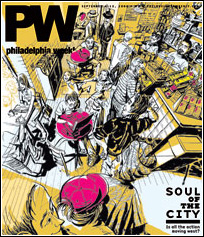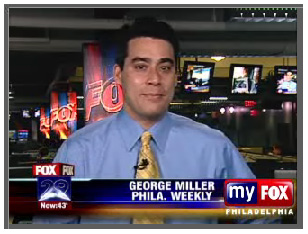Tackling the Issues
A Penn professor moonlights for the NFL.
From the December 5, 2007 Philadelphia Weekly
Class starts sharply at 9 a.m. and Penn law professor Stephen Burbank begins pacing in the center of the large, U-shaped seating area. His arms wave in the air as he calmly explains the details of Burnham v. the Superior Court of California.
In the case, the Supreme Court ruled that a New Jersey man who was served divorce papers while visiting his children in California would have to attend court proceedings in California despite residing in Jersey. Burbank - without notes - elaborates on the case, talks about the precedents and then stares directly at one of the students.
"If you were not burdened, Eric, by the constitutional jurisdiction in this case, how would you decide?" Burbank firmly asks the stunned student.
The patter of 80 students typing on laptop computers halts.
"Knowing as little as I do about the case," first-year law student Eric Beach ekes out, "I would probably get it wrong."
No one laughs.
Burbank deftly prods Beach, and the conversation flows. Burbank quotes Justice Scalia from memory. He touches on Justice White's thoughts. He recites the Fifth Amendment, and then the 14th. He talks about arguments he made advising the American delegation to the Hague.
The intricate legal information spouts from his mind as though it were common knowledge, the way a kid recites baseball stats or rap lyrics.
"Burnham is analytically chaotic," Burbank passionately concludes, "and the justices are all over the map."
It's not even 9:15 am. And even for an outsider who won't be called upon, the atmosphere is intense and intimidating.
***
When you deal with multifarious legal documents full of important-sounding but altogether arguable ideas, you need to be extremely well-versed, somewhat intense and, well, a little intimidating. So Burbank is perfectly suited for his position.
Not just as a law professor. He's also the special master for the National Football League. For the past five years, whenever major controversies have arisen between the players' association and the league, Burbank has been called upon to act as the legal arbitrator. He handles a handful of cases every year, usually those involving large sums of money, the salary cap or free agency.
"What I do as special master is not very sexy at all," he says.
Burbank, 60, most recently ruled on the Michael Vick case. In light of Vick pleading guilty to federal charges of sponsoring and gambling on illegal dog fights, Vick was indefinitely suspended from the NFL. That left a lot of money hanging in limbo.
After hearings held at Penn's law school, Burbank resolved that Vick's Atlanta Falcons have the right to seek to recover almost $20 million in bonus money from the three-time Pro Bowl player. The NFL Players Association is appealing the decision.
Vick is scheduled for federal sentencing on Monday, but the crimes he committed had no bearing on Burbank's judgment.
"That's what a lot of people don't understand," he says. "That was completely irrelevant to what I had to decide."
***
The special master position has roots in the players' strike of 1987. The day the strike ended, the NFL Players Association filed an antitrust lawsuit against the NFL. Over the following six years several players filed suits against the league. By the time Eagles defensive end Reggie White filed a class action suit against the league in October 1992, the need for the players and owners to reach a settlement was apparent to both sides.
Within a few months the parties signed an accord.
"The NFL Collective Bargaining Agreement is extraordinarily complicated," Burbank says. "It's about 280 pages long and almost mind-numbingly complex."
A federal judge appointed a special master to decide on any unforeseen issues.
"No matter how hard you try to create a comprehensive document, you nevertheless leave many things out," says Jack Friedenthal, a law professor at George Washington University who served as special master for five years before Burbank. "You're not thinking about every deal or every bad result that might occur, or everything that needs interpretation."
So the special master cleans up the messy stuff.
***
One of Burbank's first cases was the 2004 Terrell Owens situation that ultimately led to Owens - who was actually traded by the 49ers to Baltimore - becoming an Eagle. Burbank never had to render a decision because the two sides reached a settlement on the eve of Burbank's ruling.
"It's great they settled," Burbank remembers a friend telling him. "If I would've decided in favor of free agency, some people would've thought I did so because I'm in Philadelphia. If I decided against free agency, I wouldn't be able to live in Philadelphia."
A Westchester County, N.Y., native who's been at Penn since 1975, Burbank says he had his decision prepared, but he's never revealed his opinion to anyone - not even his wife.
The Harvard-trained lawyer doesn't even particularly like football.
"Having somebody who's not a passionate fan probably helps," Burbank says.
He grew up loving baseball, occasionally taking the train to the Bronx, where he once watched Mickey Mantle hit a home run from both sides of the plate in the same game.
After law school Burbank clerked for a Massachusetts Supreme Court judge and then U.S. Chief Justice Warren Burger before joining Penn as general counsel and teacher.
He's had a distinguished career - publishing widely, testifying in Congress and teaching courses around the world. The NFL and its players' association approached him about the special master position in 2002.
"It's not something you apply for," Burbank notes.
***
"I think most of us probably find his other accomplishments more interesting in a legal sense," says Beach, a first-year law student. "But the NFL stuff is fun particularly when your friends from other cities ask if you know the Penn professor they were talking about on ESPN."
This semester Burbank has spoken about his NFL work at length only once. The detailed contract discussion came shortly after his October ruling on the Vick case, and it lasted only a few minutes.
"I didn't really understand all the technicalities of what he was saying," says student Paul Vogelman. "I was wondering, 'Is it me or is everybody confused?'"
***
During the remainder of today's class, Burbank calls on only two more students, including Vogelman.
"It's much more intimidating than it appears," Vogelman says. "He calls on people at random. There's no pattern that's really discernible."
Burbank seems to take pride in his approach.
"I call on them because I want them to get used to answering questions they may not have thought about prior," he says. "They need to get used to answering questions before authority figures, whether that figure is a superior, a judge or a teacher. It's stimulating."








